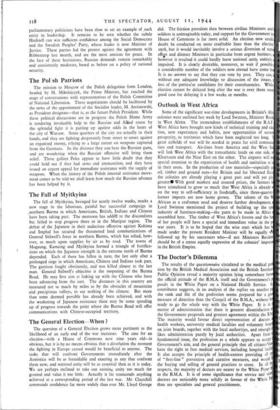The General Election—When ?
The question of a General Election grows more pertinent as the likelihood of an early end of the war increases. The case for an election—with a House of Commons now nine years old—is obvious, but it is by no means obvious that a dissolution the moment the fighting in Europe ceased would be beneficial to anyone. The tasks that will confront Governments immediately after the Armistice will be as formidable and exacting as any that confront them now, and national unity will be as essential then as it is today. We are perhaps inclined to take our existing unity too much for granted and value it too little. Actually it far transcends anything achieved at a corresponding period of the last war. Mr. Churchill commands confidence far more widely than ever Mr. Lloyd George
did. The friction prevalent then between civilian Ministers and soldiers is unimaginable today, and support for the Government in House of Commons is far more solid. An election now could doubt be conducted on more creditable lines than the election 1918, but it would inevitably involve a serious diversion of no effirt and distract Ministers in particular from urgent business, however it resulted it could hardly leave national unity entirely impaired. It is clearly desirable, moreover, to wait if possible a considerable number of the soldiers now abroad have come It is no answer to say that they can vote by post. They can, without any adequate knowledge •or discussion of the issues, less of the particuIar candidates for their constituencies. While election cannot be delayed lox* after the war is over there seem good case for delaying it a few weeks or morahs.


























 Previous page
Previous page